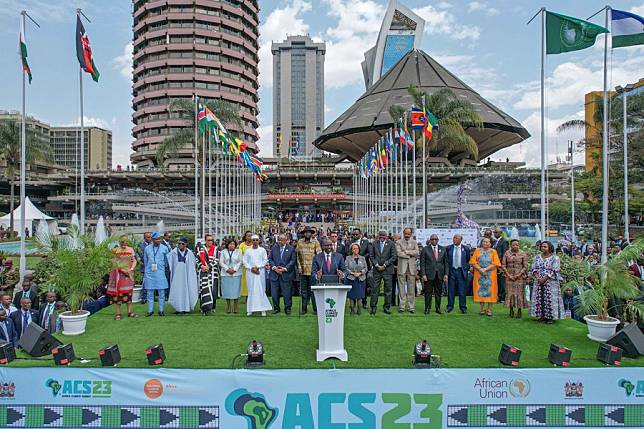African Climate Summit
By Greg Nott – The Head of the Africa Practice at Norton Rose Fulbright and specialises in energy deals

The inaugural Africa Climate Summit, convened by the African Union (AU) and championed by Kenyan President William Ruto, was recently held in Nairobi, Kenya. Nairobi is the only metropolitan that has a wildlife park within the middle of the city, and it was a fitting venue for an ecologically conscious people.
The three-day Summit brought together leaders and ministers of the Global South and beyond in a bid to define and refine a fresh and distinctive position on climate change and to influence commitments, pledges, and outcomes. It culminated in the signing of the Nairobi Declaration, which calls for the urgent restructuring of the way wealthier nations engage with Africa.
Remember Wangari Maathai? The Kenyan social, environmental, and political activist founded the Green Belt Movement and became the first African woman to win the Nobel Peace Prize for her environmental activism. Her passion and dedication to environmental issues is shared by Kenyan President William Ruto who eloquently articulated his vision for climate justice and African prosperity.
His was a clarion call for the continent as it seeks to engage in effective climate action to save our continent from environmental catastrophe and lift millions out of poverty:
“African nations are emerging as new torch bearers of the most impactful climate action and we aspire to chart a new growth agenda that will deliver shared prosperity and a new growth agenda,” said President Ruto.
Just energy transition for Africa
Despite its small contribution to global carbon emissions, Africa has been devasted by storms, wildfires, and floods in recent years that have resulted in substantial GDP losses. Several African nations are also grappling with lacklustre economic growth, high inflation, and millions of Africans still go about life without electricity. Faced with unfavourable financing conditions from global financing institutions, Africa is further hampered in dealing with climate crises when they hit.
Although African nations are disproportionately hit by climate change, President Ruto believes the time is ripe to shift the narrative away from a blame game to find a common middle ground where North and South agree to action beyond pledges and pleasantries.
“Climate change is not a Global North issue or a Global South issue. It is our collective challenge, and it affects all of us. We need to come together to find common, global solutions. We are committed to bringing everyone on board so every voice is heard,” President Ruto said at the Summit, flying the flag as an African unifier.
To date, wealthy nations have pledged $100 billion per annum to assist poorer nations to mitigate climate change risks, but Africa is yet to see the real fruit of these pledges take effect on its poorest communities.
At the Summit, investors announced an additional $23 billion in pledges and commitments to African renewable projects including solar microgrids, carbon markets and reforestation. It remains to be seen whether those pledges go beyond good intentions, but the Summit was nonetheless very important in amplifying Africa’s collective voice on its need for climate justice.
“An injustice burns at the heart of the climate crisis, and its flame is scorching hopes and possibilities here in Africa,” said António Guterres, the U.N. Secretary General from the sidelines of the event. The Secretary General urged participants to think big. “First, we need far greater climate ambition, with countries hitting fast forward and massively accelerating action to limit temperature rises and impacts. The largest emitters must lead the charge, in line with the Climate Solidarity Pact(link is external) and Climate Action Acceleration Agenda),” the UN chief said.
The lack of climate change financing is one of the biggest issues dividing rich and poor nations as the world struggles to curb carbon emissions. It will be one of the main points of contention at the November 2023 United Nations global climate summit in Dubai.
African attendees were unified in their request for “concessional” finance (loans at below-market interest rates) and with more lenient timelines for repayment. According to the New York Times, concessional finance could in the near future come from the World Bank and International Monetary Fund (IMF), among others, if African nations follow through on promised reforms to the way they assess risk and incorporate climate considerations in their loan structuring.
Call for Global Taxes and Funding Mechanisms
The Nairobi Declaration advocates for targeted taxes on sectors like aviation and maritime, the removal of fossil fuel subsidies worldwide, and the implementation of a global fossil fuel tax.
Additionally, the Declaration proposes that the Carbon Border Adjustment Mechanisms (CBAM) be deployed as a tax for targeted mitigation and adaptation efforts.
A Financial Transactions Tax on a global scale is another potential avenue for generating significant revenue. These global taxes should be collected and pooled in a single global fund, President Ruto proposes, with allocation based on achieving the highest climate impact and supporting technological innovation. A global governance body, independent of national interests, should oversee the fair distribution of funds.
The message from the Summit was that ‘Africa is ready to contribute to global decarbonization efforts by leveraging its abundant resources, but Africa needs favour and just financing agreements.
The inaugural Summit in Nairobi was part of an effort by poorer nations to amplify their arguments and the Nairobi Declaration is serving as “a basis for Africa’s common position” ahead of the United Nations-sponsored climate talks in Dubai.
“Africa is ushering international solidarity and multilateral governance to guide the world in climate action and a new green industrial age. We are championing new values to reconcile sustainable development with environmental responsibility through decarbonisation and clean production and advocating for inclusion and justice,” President Ruto concluded.





